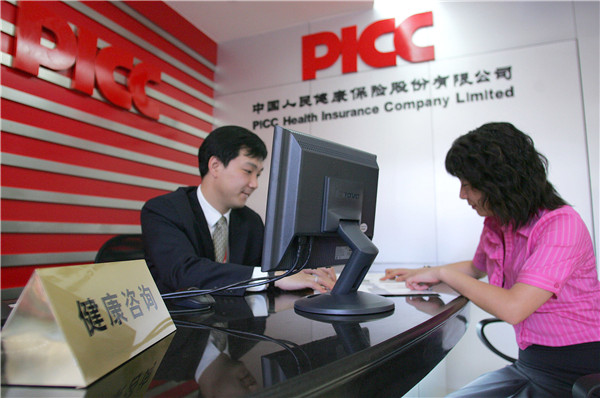
A branch of PICC Health Insurance Co Ltd in Shanghai. As China continues to urbanize and age, commercial health insurance has entered a state of rapid development.(WU JUN/CHINA DAILY)
Focus is on private health insurance as some Chinese increase spending
Gaming firms, real-estate companies and drug makers in China are chasing what they hope will be the country's next hot commodity: private health insurance.
At least 29 publicly traded Chinese companies have announced plans to invest in commercial insurance businesses since 2015, according to a report from researcher VC Beat and corporate statements. The new ventures are focused partly, or entirely, on health insurance, an area where affluent Chinese families are ramping up spending.
The China Insurance Regulatory Commission estimates that premium income for private health insurers jumped by 94 percent in the first seven months this year. That topped the last year's already substantial 52 percent surge, fueled by policy incentives and China's rising prevalence of chronic conditions like heart disease.
"The growth is sustainable because all the drivers will continue to be there, especially the demand for health care services," said Luo Ying, partner and managing director at consultancy Boston Consulting Group.
In an August report, BCG and insurer Munich Re estimated that the market measured by premium income will more than quadruple from 240 billion yuan ($36 billion) last year to 1.1 trillion yuan by 2020.
Burdened by the rising cost of its vast public health system, China has for years sought to encourage private company entrants. Those efforts gained a substantial boost recently from a 31-city trial program, which provided an income tax exemption on insurance premium payments, albeit for only up to 2,400 yuan a year.
The emergence of private health insurance is a new trend and most people in China still rely on a government-backed scheme which doesn't cover many costly drugs for diseases like cancer. Patients also face lengthy delays at public hospitals for care. Private health insurance accounted for only about 7 percent of personal health expenditure in China last year, according to BCG.
Companies venturing into health insurance range from drug manufacturer Kangmei Pharmaceutical Co and physical check-up chain Meinian Onehealth Healthcare Holdings Co to even property developer Suning Universal Co and Dalian Zeus Entertainment Group Co, which develops online games.
Alibaba Health Information Technology Ltd. the health care arm of billionaire Jack Ma's Alibaba Group Holding Ltd, in April announced plans to form a joint venture with partners including China Taiping Insurance Holdings Co for internet health insurance-related operations in China. Owing to government restrictions on foreign investments in health insurance, multinationals like Cigna Corp and Allianz SE often operate through joint ventures with local partners in China.
Health-related companies often invest in insurance to provide a more complete range of services, while other firms might be seeking to diversify into a high-growth business, said Zhao Heng, founder of a local health care consultancy called Latitude Health.
As China continues to urbanize and age, commercial health insurance has entered a state of rapid development and investing in a health insurer represents a step in Suning Universal's transition toward the finance sector, the company said in an Aug 25 statement.
Still, there are several challenges. The health insurance business requires scale and it can be challenging for small companies to make money, said BCG's Luo. "Therefore, non-insurer investors need to be very careful when entering this market."
Getting an insurance license can also be difficult for many companies and another major risk is "a weak understanding of the market", said Zhao. Unlike other insurers, health insurance companies often face high payment ratios and may not always be able to reap large profits even in developed markets, said Zhao.
China's public hospitals remain heavily dependent on medicine sales for revenue. So, doctors lack the incentive to control costs, a headache for commercial health insurance providers, according to Zhao.
The solution to the problem, BCG says, will be the rise of private hospitals in China.


















































